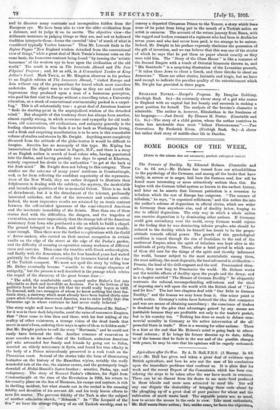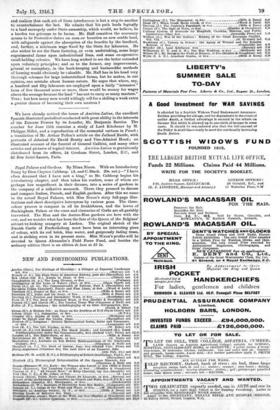- Agriculture after the War. By A. D. Hall, F.R.S.
(J. Murray. 3s. 6di net.)—Mr. Hall has given and taken a great deal of evidence upon British agriculture, and here he sets out the sum of his conclusions upon the immediate problems that confront us. It is plain that his work and the- recent Report of the Commission which has been con- ' sidering the- steps to be taken after the war have- much in common. There can be no dissent from his desire to see more food produced in these islands and more men attracted to rural life. Nor will any one dispute the desirability of bringing these ends about by 'the ploughing up of a great deal of poor pasture for wheat and the cultivation of much waste land. The arguable points are, as usual, how to secure the means to the ends in view. Like most enthusiast; Mr. Hall wants-State action; but unlike some, he faces the objections, and.realizes that each act of State interference is but a step to,another to counterbalance the last. He admits that his path leads logically to a land monopoly under State-ownership, which would, we believe, be a burden too grievons to be borne. Mr. Had considers the necessary means to be Protective duties en corn.or bounties on now arable land, with safeguards against the absorption of the benefits by the landlord, and, further, a minimum wage 'fixed 'by the State for labourers.. He also wishes to see the State fostering, or even undertaking, some large .experimental farms upon industrialized lines, and some co-operative small-holding colonies. We have-long wished to see the latter extended upon voluntary principles.; and as to the former, any improvement, !general or exemplary, in the book-keeping and businesslike methods of farming would obviously be valuable. Mr. Hall has in his head very thorough schemes for large industrialized farms, but he makes, in our opinion, one mistake about human nature. He urges that where, say, ,a hundred and fifty labourers are employed upon,a fairly "intensive" farm of five thousand acres or more, there would be money for wages abovetheaverage because the land " has not to carry so many masters." True; but how many men would willingly sell for a shilling a week extra a greater chance of becoming their own masters ?































 Previous page
Previous page